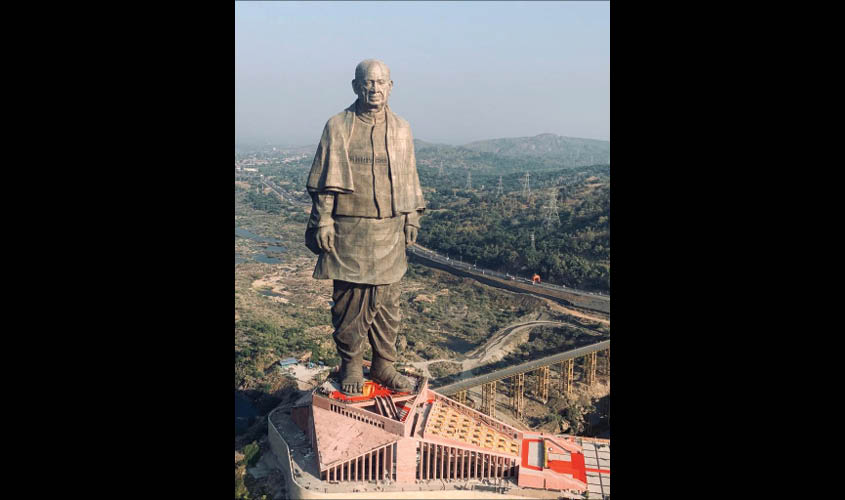In Sardar Patel: Unifier of Modern India, historian R.N.P. Singh presents a riveting account of how Sardar Patel helped cement the territorial integrity of independent India by getting 500-plus princely states to accede to the Indian Union, writes J.S. Rajput.
Generations ahead would find it hard to believe that at the time of Independence, India was not only partitioned but also thrown into a strategic manipulation that could “inevitably” lead to its dismemberment into numerous principalities and nationalities. The Memorandum on States’ Treaties and Paramountcy, issued on 22 May 1946, led to the interpretation that after the departure of the British, princely states could negotiate with India or Pakistan on “equal terms” on their future relationship. Several of the princes, led by the Nawab of Bhopal, began preparations for their own strategic liberties. The Nawab of Bhopal wished to become the successor Governor General of Pakistan after Jinnah. Junagadh declared its accession to Pakistan. Hyderabad found natural kinship with Pakistan. So much more! There were also other princes who could feel the pulse of their people, could read the trends of the times, and knew that accession to Indian Union was the best possible alternative available to them. It included the Maharajas of Baroda, Bikaner, Patiala and others. This group did not ignore the sacrifices people had made as Indians during the freedom struggle. They would settle for nothing less than popular elected governments in a truly democratic setup. It was indeed a stupendous task to bring together 560 states in the Indian Union, and rein in the ambitious and deviant Nawabs and Nijams. That such an unprecedented accession to Indian union could be achieved poses the obvious query, “Who could do it, and how the miracle was achieved?” Yes, India needed an Iron man of steely determination, and unprecedented courage and unmatched commitment to the motherland. The Sardar of Bardoli, the leader of the farmers of Kheda in Gujarat, fitted perfectly in the mould. India was fortunate to have entrusted the task of uniting India to Sardar Vallabh Bhai Patel.
To visualise the persona of the Sardar during his last five years, a single instance would suffice. On 26 October 1947 Pakistan attacked Kashmir Valley. Claimed as Kabaili invasion, it was the handiwork of the Pak Army, it got full assistance of the Muslim soldiers of the Maharajah Hari Singh who deserted their posts to join the enemy forces after killing their Commanding Officer, Lt. Col. Narain Singh. While the state was being overrun by invaders from Pakistan and internal saboteurs, Nehru dithered on sending the Indian Army account of inadequacies of formalities, the description of the top-level meeting held on 26 October 1947 says it all: “Lord Mountbatten exhibited studied diffidence. Pandit Ji (Nehru) presented a picture of acute anxiety and concern. Sardar listened, did not utter a word. He was picture of calm equipoise. His silence was a strange contrast to a picture of defeatism and helplessness that otherwise pervaded in the meeting. Suddenly Sardar moved in his seat and immediately after his gruff and resolute voice attracted everybody: ‘Look here Generals, Kashmir must be defended at all costs and come what may, resources or no resources… This must, must and must be done. Do whatever you like but do it.’” Even after the Kashmir issue is, hopefully, resolved in the future, the query would survive: what if Sardar Patel had handled the Kashmir’s accession also?

Integrating all the princely states was a unique unprecedented historical challenge before a newly independent India, reeling under the debilitating impact of Partition, sweeping poverty, and communal dissensions. Only an exceptionally astute person could take the gauntlet and plunge himself in the task of creating a united India out of the chaos inherited. The rustic looking farmer from Kheda changed the direction of history and rest is the saga for generations ahead to marvel at his unparalleled achievements. It is no secret that during the first couple of decades after Independence, the contributions of Sardar Patel were somehow not given the pride of place in the narratives on freedom struggle though the generation that had participated in the Independence movement adored and admired him intensely. Well-known author and historian by choice, R.N.P. Singh has recently conducted a research study, with exemplary dexterity coupled with the professional integrity of an experienced researcher, on Sardar’s singular achievement in cementing the territorial integrity of India, bringing to Union 560 States within 18 months. His latest book, Sardar Patel: Unifier of Modern India, unearths several
R.N.P. Singh has made a great professional contribution in analysing how Patel could succeed in uniting India that was left at the brink of fragmentation. His seminal research fulfils a wide gap in an objective narrative of that tumultuous period.

